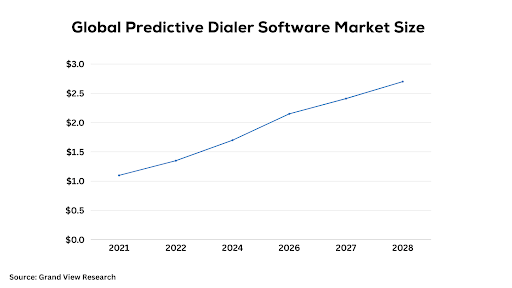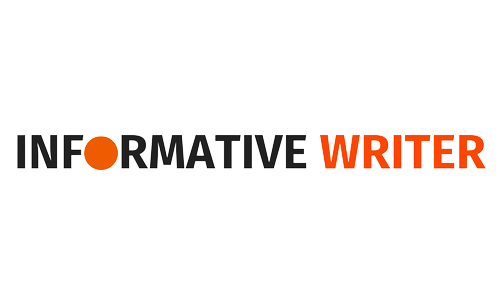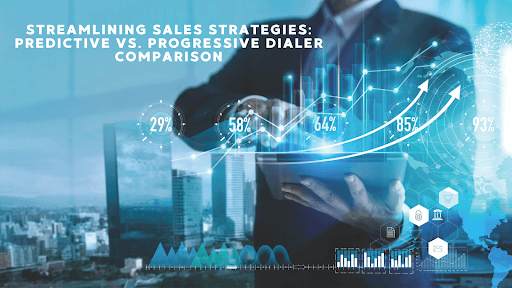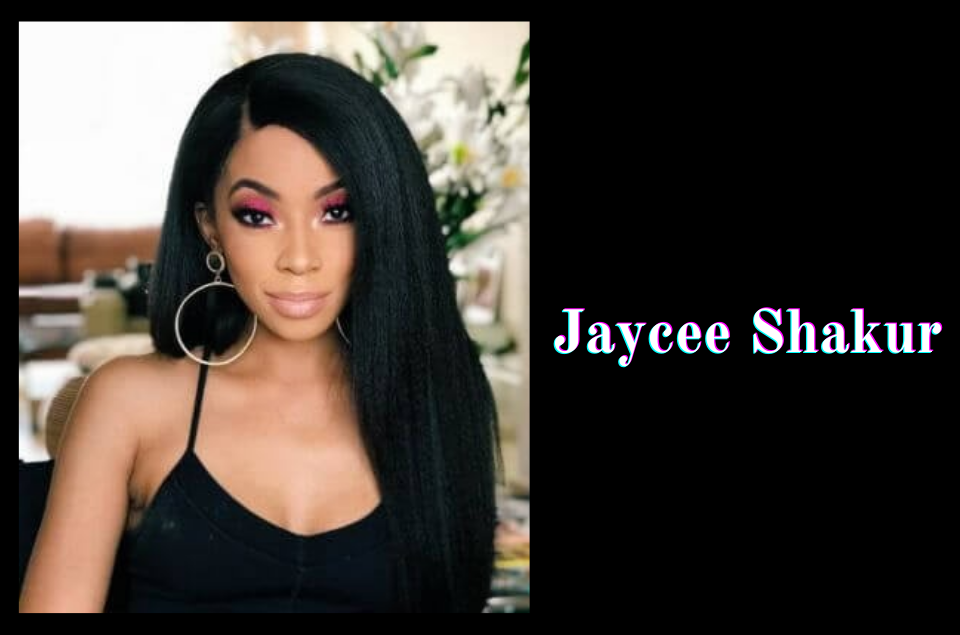In the ever-evolving landscape of sales and customer engagement, businesses are constantly seeking innovative ways to optimize their strategies and stay ahead of the competition. One area that has garnered significant attention is the use of dialing technologies, specifically predictive and progressive dialers. These advanced systems have the potential to revolutionize the way sales teams operate, streamlining processes and enhancing efficiency.
Table of Contents
Understanding the Operational Dynamics
Whether utilizing a predictive dialer for high-volume campaigns or a progressive dialer for more targeted outreach, having the right dialer for call center operations can significantly streamline sales strategies and drive success in today’s competitive market.
What is a Predictive Dialers?
Predictive dialers are designed to maximize call volume and operational efficiency by leveraging advanced algorithms to predict agent availability. They can dial multiple numbers simultaneously, ensuring that agents are connected to live calls as soon as they become available. This system is particularly advantageous for businesses with high outbound call requirements, such as telemarketing and lead generation companies.
Predictive dialers work by constantly analyzing various factors, including agent availability, call handling times, and customer data, to determine the optimal number of outbound calls to initiate. By using complex algorithms to predict agent availability and simultaneously dialing multiple numbers, these systems maximize live call connections.

According to the report, the global predictive dialer software market size was valued at $1.03 billion in 2020 and is expected to expand at a compound annual growth rate (CAGR) of 37.0% from 2021 to 2028. This growth is attributed to the increasing adoption of cloud-based predictive dialer solutions, which offer scalability, flexibility, and cost-effectiveness for businesses of all sizes.
However, it’s important to note that predictive dialers can potentially lead to higher call abandonment rates if not configured properly. To mitigate this risk, these systems typically employ an abandon rate setting, which caps the maximum percentage of calls that can be abandoned before an agent becomes available.
For a detailed comparison of predictive vs progressive dialer, it’s essential to understand the distinct operational dynamics of these two technologies.
What are Progressive Dialers?
In contrast to predictive dialers, progressive dialers take a more measured approach by dialing one contact at a time, ensuring that an agent is always available when the call is connected. This approach prioritizes personalized customer interaction and satisfaction by eliminating the risk of call abandonment and ensuring compliance with telemarketing regulations.
Progressive call dialer software initiates a new call only after an agent has completed the previous call and become available again. This method ensures that every phone call dialer is answered promptly by a live agent, providing a seamless customer experience and reducing the likelihood of frustration or dissatisfaction.
Progressive dialers, prioritizing personalized interaction and compliance over call volume, appeal to businesses in regulated industries or those valuing customer satisfaction highly.
By providing more detailed information on how predictive and progressive dialers operate, readers can better understand the trade-offs and strategic considerations involved in choosing the appropriate dialing technology for their business needs.
Comparing Effectiveness and Efficiency
While both predictive and progressive dialers aim to streamline sales strategies, they differ in their approach and the trade-offs they present. Understanding these trade-offs is crucial for businesses to make informed decisions.
Call Frequency and Volume: Predictive dialers undoubtedly take the lead when it comes to call frequency and volume. By initiating calls based on predictive algorithms, these systems can achieve significantly higher call rates compared to progressive dialers, which dial one number at a time.
Abandonment Rates: The high call volume of predictive dialers may result in compliance issues and elevated call abandonment rates. Predictive dialers can have abandonment rates as high as which may lead to dissatisfied customers and potential regulatory violations.
Compliance and Customer Satisfaction: By ensuring compliance with telemarketing regulations and prioritizing customer experience, progressive dialers excel. By ensuring that an agent is always available when a call is connected, progressive dialers virtually eliminate the risk of call abandonment, leading to higher customer satisfaction rates.
Agent Productivity: Although predictive dialers increase call volume, progressive dialers enhance productivity through meaningful interactions and less time on unproductive calls.
Leveraging mobile phone dialers and call center dialer software, organizations can enhance their outreach efforts by leveraging the convenience and accessibility of mobile devices.
Strategic Application in Business Scenarios
The choice between predictive or progressive dialer software largely depends on the specific business scenario and priorities. Here are some common scenarios where one dialer might be preferred over the other:
High-Volume Sales Campaigns: When speed and reach are paramount, predictive dialers are ideal for high-volume sales campaigns that prioritize maximizing call volume and lead generation. Industries such as telemarketing, debt collection, and political campaigning often benefit from the efficiency of predictive dialers.
Relationship Building and Complex Sales: On the other hand, progressive dialers are better suited for businesses focusing on relationship building, upselling, or complex sales processes that require more personalized attention and detailed customer engagement. Industries like financial services, insurance, and high-end product sales often prefer progressive dialers to ensure a seamless customer experience.
Regulatory Compliance: If regulatory compliance is a top priority, progressive dialers offer a safer option by virtually eliminating the risk of call abandonment and potential legal violations associated with predictive dialing.
It’s important to note that some businesses may opt for a hybrid approach, utilizing both predictive and progressive dialers for different segments of their sales strategies. Additionally, employing a phone dialer program tailored for sales purposes enables agents to efficiently manage and track their calls which improves productivity and effectiveness.
Making the Right Choice for Your Business
Choosing the appropriate dialer technology is a critical decision that can significantly impact your sales strategy’s success. To make the right choice, businesses must carefully evaluate their needs, customer engagement strategies, and regulatory compliance requirements.
Evaluating Business Needs: Start by assessing your business’s specific goals and priorities. Are you primarily focused on maximizing call volume and lead generation, or do you prioritize personalized customer interactions and relationship building? Understanding these goals will help you determine whether a predictive or progressive dialer aligns better with your objectives.
Customer Engagement Strategies: Consider your customer engagement strategies and the level of personalization required. If your sales process involves complex product offerings or requires in-depth customer consultations, a progressive dialer may be more suitable to ensure high-quality interactions.
Regulatory Compliance Requirements: Compliance with telemarketing regulations is a crucial consideration. If your business operates in a heavily regulated industry or targets regions with stringent compliance requirements, a progressive dialer may be the safer choice to avoid potential legal issues and fines.
Scale of Operations: Evaluate the scale of your operations and the volume of outbound calls required. If you have a large sales team and a high demand for outbound calls, a dialer system for call center operations ensures that agents can manage their calls effectively, maximizing productivity and effectiveness.
Nature of Products or Services: The nature of your products or services can also influence your dialer choice. For example, businesses offering high-value or complex products may benefit from the personalized approach of a progressive dialer, while those with more standardized offerings may prioritize the efficiency of a predictive dialer.
By carefully weighing these factors, you can make an informed decision that aligns with your business’s unique needs and objectives, ultimately optimizing your sales strategy for success.
Alternative Options for Outbound Dialers Software
While predictive and progressive dialers are the most widely used dialing technologies, it’s worth considering alternative solutions that may better suit specific business objectives. Here are a few alternatives to explore:
Power Dialers: Power dialers also known as preview dialers offer a hybrid approach that combines elements of predictive and progressive dialing. These systems allow agents to preview customer information before initiating a call enabling a more personalized interaction while maintaining a reasonable call volume.
Preview Dialers: Similar to power dialers, preview dialers present agents with customer information before dialing a number. This approach is well-suited for scenarios where a high level of personalization and preparation is required such as complex sales processes or call progressive customer service interactions.
Omnichannel Dialers: As customer communication preferences evolve, omnichannel software has emerged to facilitate engagement across multiple channels, including voice, email, SMS, and social media. These dialers can help businesses provide a seamless customer experience by integrating various communication channels into a unified platform.
Leveraging cloud contact center solutions such as omnichannel call center software and omnichannel customer support software enables businesses to integrate various communication channels seamlessly.
By staying informed about the latest market trends and emerging technologies, businesses can make more informed decisions when it comes to optimizing their sales strategies and leveraging the power of dialing solutions.
Also, Check – The Essential Guide To Choosing The Best Firefighter Radio Holster
Frequently Asked Questions
1. How do I determine which dialer type aligns with my specific sales goals?
Choosing between predictive and progressive dialers depends on your campaign objectives. If your priority is maximum call volume and rapid connections, predictive dialers are the way to go. However, if you value quality interactions and personalized conversations, progressive dialers are the superior choice. Assess your sales targets and customer engagement requirements to make an informed decision.
2. Can I switch between dialer types based on different campaigns?
Many call centers adopt a hybrid approach, leveraging predictive dialers for certain campaigns and progressive dialers for others. This flexibility allows you to tailor your strategy based on the nature of your leads, ensuring optimal results. Remember that adaptability is key in the dynamic world of sales.
3. How can I optimize my dialer strategy for lead conversion?
Regardless of the dialer type you choose, focus on data quality and agent training. Clean, accurate data ensures that your dialer reaches the right prospects. Additionally, invest in training programs that empower agents to handle calls effectively. A well-prepared team, armed with the right dialer, can significantly boost lead conversion rates.
Conclusion
In the ever-changing landscape of sales and customer engagement, businesses must continuously adapt and optimize their strategies to stay ahead of the competition. The choice between predictive and progressive dialers is a critical decision that can significantly impact operational efficiency, customer satisfaction, and regulatory compliance.
While predictive dialers offer the advantage of maximizing call volume and agent productivity, progressive dialers prioritize personalized customer interactions and adherence to telemarketing regulations. By carefully evaluating their business needs, customer engagement strategies, and compliance requirements, organizations can make an informed choice that aligns with their unique objectives.
Additionally, employing a progressive call center representative allows for a more targeted approach to customer outreach, ensuring that sales efforts are tailored to the individual needs and preferences of each prospect.



















